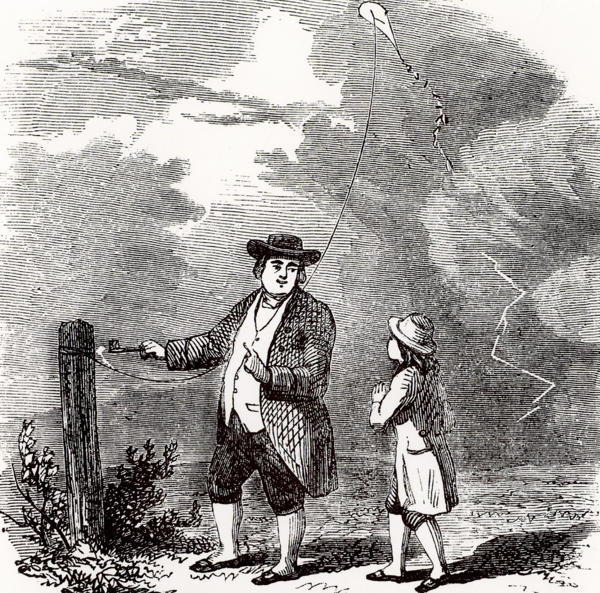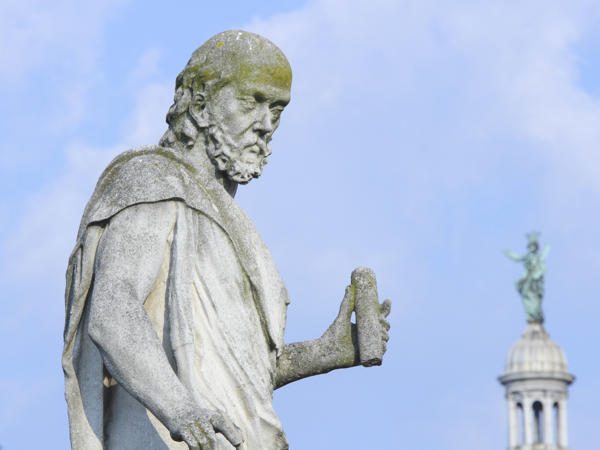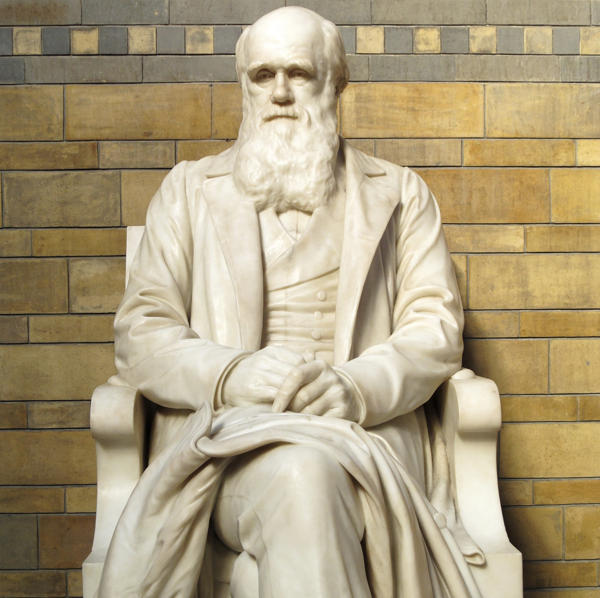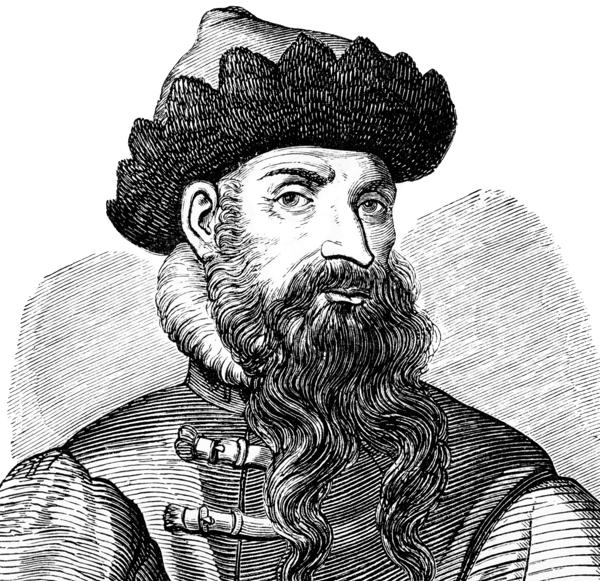Famous Scientists and Their Inventions
Important Inventors...
Alexander Graham Bell (March 3, 1847 - August 2, 1922)
Invented the first practical telephone following extensive work on elocution and deafness.
Antonie van Leeuwenhoek (October 24, 1632 - August 26, 1723)
Invented the microscope. Leeuwenhoek is also considered as the first microbiologist in the world and the father of microbiology.
Archimedes (c. 287-212 BC)
Invented the Archimedean Screw, used for drawing water out of flooded ships, or from canals for irrigation. Archimedes also discovered the method for determining the volume of irregular objects.
Benjamin Franklin (January 17, 1706 - April 17, 1790)

Invented the lightning rod and bifocals, among other inventions. He is also famous as one of the Founding Fathers of the United States.
Brahmagupta (c. 597 - 668 AD)
Brahmagupta was the first to use zero as a number, although it had been in use before his time as a symbol, representing the order of magnitude of the number in question (7 - 70 - 700 etc.). Consequently, he devised the rules of arithmetic involving zero. Brahmagupta was also the first to note that the product of two negative numbers is a positive number.
Eli Whitney (December 8, 1765 - January 8, 1825)
Invented the cotton gin, which helped speed up the industrial revolution by a great degree.
Elias Howe (July 9, 1819 - October 3, 1867)
The Sewing machine
Emile Berliner (May 20, 1851 - August 3, 1929)
Phonograph records
Felix Hoffmann (January 21, 1868 - February 8, 1946)
Formulated aspirin and heroin in medically usable forms.
Fritz Pfleumer (March 20, 1881 - August 29, 1945)
Invented the magnetic tape used in audio cassettes.
Galileo Galilei (February 15 1564 - January 8 1642)

Invented, among other devices, the telescope and the military compass. Galilei made several crucial astronomical observations (such as Jupiter's four largest moons, which are called the Galilean moons in his honor), and promoted the Copernican view that the earth revolves around the sun -- the latter inviting the wrath of the Church.
Garrett Augustus Morgan (March 4, 1877 - July 27, 1963))
Invented the traffic signal and a version of the gas mask (mainly for firefighters).
Hans von Ohain (December 14, 1911 - March 13, 1998)
Jet engine
Heinrich Focke (October 8, 1890 - February 25, 1979)
Built the first practicably functional helicopter.
Jagadish Chandra Bose (Basu) (November 30, 1858 - November 23, 1937)
Invented the crescograph, a device to measure growth in plants. Bose invented the crescograph to aid his own research on the effects of external stimuli on the growth of plants. Bose also made pioneering research in the field of radio transmission, and demonstrated the first wireless signaling in the world. Marconi's future (and patent-yielding) research was aided by Bose, who made his research available to the scientific community instead of rushing off to privatize the invention of the radio.
Johann Philipp Reis (January 7, 1834 - January 14, 1874)
Invented an early version of the telephone that only worked on an 'on/off' basis, and thus could only convey a steady note when spoken into. It failed at reproducing articulated speech (which is a constantly changing mixture of different vibrations) and was thus impractical.
John Logie Baird (August 13, 1888 - June 14, 1946)
Invented the first practical Television. Baird's original design was electromechanical rather than fully electronic. He also invented the color television tube.
Karl Benz (November 25, 1844 - April 4, 1929)
Invented the first self-propelled, gasoline-powered automobile.
Karl Friedrich von Drais (April 29, 1785 - December 29, 1851)
Invented a pedal-less early version of the bicycle, the draisine.
Karlheinz Brandenburg (b. June 20, 1954)
Co-inventor of MP3 Technology
Konrad Zuse (June 22, 1910 - December 18, 1995)
Built the first working, programmable, electromechanical computer.
Laszlo Jozsef Bíro (September 29, 1899 - October 24, 1985)
Invented the ballpoint pen, still commonly called biro after him.
Levi Strauss (February 26, 1829 - September 26, 1902)
Denim trousers (Jeans)
Melitta Bentz (January 31, 1873 - June 29, 1950)
Coffee filter
Nikola Tesla (July 10, 1856 - January 7, 1943)
Built the Tesla induction motor, the Tesla coil and a pioneering mechanism for wireless (radio) communication.
Orville and Wilbur Wright
Invented the airplane, i.e., susccessfully completed the first powered heavier-than-air flight.
Otto Lilienthal (May 23, 1848 - August 10, 1896)
An early pioneer of gliders. Lilienthal designed and built several flying machines, including monoplanes, biplanes and gliders.
Percy Spencer (July 9, 1894 - September 8, 1970)
Microwave oven
Peter Henlein (1479 - 1542)
Considered the inventor of the pocket watch (early history of watches has not been sufficiently determined).
Rudolf Diesel (March 18, 1858 - disappeared September 29, 1913)
Invented the compression combustion engine, which was named the Diesel engine after him.
Rudolf Hell (December 19, 1901 - March 11, 2002)
Formulated pioneering technology for the scanner and the fax machine (hellschreiber).
Thomas Edison (February 11, 1847 - October 18, 1931)
Edison was involved in countless inventions, either directly or through the several engineers he employed. He is known for the invention and commercialization of the electric light and the phonograph.
William Henry Perkin (March 12, 1838 - July 14, 1907)
First to produce a synthetic aniline dye -- mauveine, of the color mauve.
... And Discoverers
Albert Einstein (March 14, 1879 - April 18, 1955)
Perhaps the most famous scientist in history, Einstein formulated the theory of general relativity, and the famous equation of mass-energy equivalence - E=mc2.
Alexander Fleming (August 6, 1881 - March 11, 1955)
Discovered the fungus responsible for the production of penicillin, Penicillium notatum.
Andreas Vesalius (December 31, 1514 - October 15, 1564)
First to describe the human skeletal system and muscular system accurately and in great detail.
Aryabhata (476 AD - 550 AD)
Approximated the value of pi to 3.1416 -- 5 significant figures (4 decimal places), and was possibly the first to note the irrationality of pi. Aryabhata also did commendable work in trigonometry, creating one of the earliest trigonometric tables (later found to be accurate), and astronomy, discovering the daily rotation of the earth.
Carl Linnaeus (May 12, 1707 - January 10, 1778)
Formed the taxonomical system of binomial nomenclature, wherein the name of the genus is followed by the name of the species. For instance, human beings are termed as Homo sapiens, wherein Homo is the genus and sapiens is the species.
Carl Wilhelm Scheele (December 9, 1742 - May 21, 1786)
Discovered oxygen, although Joseph Priestly published his findings first and is thus given credit for the discovery.
Sir Chandrashekhar Venkata Raman (November 7, 1888 - November 21, 1970)
Discovered the change in the wavelength -- and thus the color -- of light traveling through a transparent medium, a phenomenon later named after him -- the Raman effect.
Charles Darwin (February 12, 1809 - April 19, 1882)

Formulated the theory of evolution, explaining the huge diversity in organisms as a result of millions of years of unceasing evolution programmed by natural selection.
Copernicus (February 19, 1473 - May 24, 1543)

The first to accurately describe the solar system as heliocentric (having the sun at the center) rather than geocentric (having the earth at the center)
Dmitri Mendeleev (February 8, 1834 - February 2, 1907)
Created a comprehensive periodic table of elements, incorporating the Newland's law of octaves and leaving blanks where he theorized the presence of elements that had not yet been discovered. Most of these gaps were later found to be correct.
Edward Jenner (May 17, 1749 - January 26, 1823)
Discovered the process of vaccination by proving that deliberate (or accidental) infection of cowpox provided immunity against smallpox, an untreatable disease in Jenner's time. Jenner is said to have saved more lives than any other man in history!
Ernest Rutherford (August 30, 1871 - October 19, 1937)
Discovered the phenomenon of radioactive half-life and the change in the atomic number of the element due to radiation, sowing the seeds of the extensive future research into nuclear fission. Due to his highly influential findings, Rutherford is termed the 'father of nuclear physics'.
Francis Crick - James Watson (Crick: June 8, 1916 - July 28, 2004 / Watson: b. April 6, 1928)
Discovered the double-helical structure of the DNA molecule.
Georg Ohm (March 16, 1789 - July 6, 1854)
Discovered the proportionality between the voltage and the resultant current in a circuit, now known as Ohm's law: I (current) = V (voltage)/ R (resistance)
Heinrich Hertz (February 22, 1857 - January 1, 1894)
Proved the existence of electromagnetic waves by constructing radio equipment. Although Hertz didn't realize the full ramifications of his work, the seminal research led to the discoveries made by Jagadish Chandra Bose, Marconi et al.
Henri Becquerel (December 15, 1852 - August 25, 1908)
Discovered radioactivity in uranium salts.
Isaac Newton (December 25, 1642 - March 20, 1727)
One of the most revered scientists in history (and rightly so), Newton discovered and formulated the laws of gravity and the three laws of motion, along with invaluable work in several other fields. He was also closely involved in the development of calculus.
James Chadwick (October 20, 1891 - July 24, 1974)
Discovered the electrically neutral particle in atoms, neutron.
Johann Kepler (December 27, 1571 - November 15, 1630)
Formulated the laws of planetary motion, which are named after him.
Marie Sklodowska-Curie - Pierre Curie
Expounding on the work of Marie's Doctoral Advisor Henri Becquerel, Marie and Pierre Curie discovered the radioactive elements Radium (Ra) and Polonium (Po). Their work in radioactivity (a term coined by Marie Curie, incidentally) resulted in Marie Curie, Pierre Curie and Henri Becquerel receiving the 1903 Nobel Prize in Physics.
Max Planck (April 23, 1858 - October 4, 1947)
A theoretical physicist by nature and profession, Planck formulated the quantum theory, considered one of the most important theories of modern physics.
Michael Faraday (September 22, 1791 - August 25, 1867)
Discovered electromagnetic induction, laws of electrolysis and fundamental relations between light and magnetism. Faraday is considered the greatest experimentalist.
Neils Bohr (October 7, 1885 - November 18, 1962)
Formulated the Bohr model of the atom.
Otto Hahn (March 8, 1879 - July 28, 1968)
Discovered nuclear fission. During the related research, Hahn collaborated with Lise Meitner and her nephew Otto Frisch, who confirmed Hahn's results and coined the term 'nuclear fission'; Hahn was initially baffled by the results, which did not fit in the prevalent scientific paradigm.
Robert Koch (1843-1910)
Renowned for the isolation of Bacillus anthracis, Mycobacterium tuberculosis and Vibrio cholerae, the bacteria responsible for the diseases anthrax, tuberculosis and cholera, respectively. Although the diseases may not sound sinister in the 21st century, they were among the deadliest in the 19th century. Koch is also known for his eponymous postulates about the determination of the particular microbe responsible for a disease.
Srinivasa Ramanujan (December 22, 1887 - April 26, 1920)
Isolated from the European mathematics community, Srinivasa Ramanujan rediscovered several previously discovered theorems, as well as several new ones. Ramanujan's groundbreaking and unorthodox derivations are still being heavily researched by mathematicians all over the world.
Wilhelm Conrad Rontgen (March 27, 1845 - February 10, 1923)
Discovered the X-ray, and thus considered the father of diagnostic radiology.
William Harvey (April 1, 1578 - June 3, 1657)
Described the 'double cycle' nature of the human circulatory system (organs-veins-heart-lungs-heart-arteries-organs).
It is impossible, having been pampered by most of these invaluable inventions ever since memories started to form, to imagine where mankind would have ended up if not for these Herculeses and Achilleses disguised in lab coats.
Famous Scientists and Their Inventions
![Famous Scientists and Their Inventions]() Reviewed by Tech Master
on
8:46 AM
Rating: 5
Reviewed by Tech Master
on
8:46 AM
Rating: 5

No comments